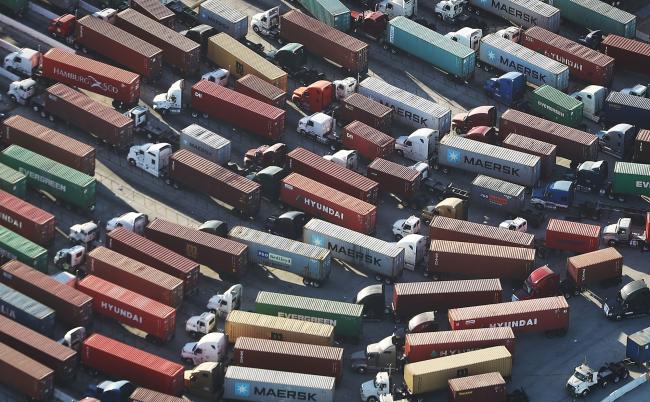(Bloomberg) -- Things are getting worse. That’s a conclusion one might have reasonably reached after reading this week’s U.S.-China headlines.
First, there was Hong Kong, a matter Beijing has warned Washington to stay clear of. Protesters last weekend battled police, vandalized shops and paralyzed swaths of the Asia financial center. Then President Donald Trump tied outcomes in Hong Kong to trade.
Next, as China’s top trade negotiator prepared to travel to Washington for a new round of talks, the U.S. blacklisted eight prominent Chinese tech firms. In explaining the action, the U.S. cited the companies’ involvement in China’s westernmost Xinjiang province, where up to a million predominantly Muslim ethnic minorities have been allegedly detained.
A day later, the U.S. imposed travel bans on Chinese officials linked to Xinjiang. And it emerged that the Trump administration was moving ahead with discussing possible limits on portfolio flows into China.
These are not events that instill confidence in the state of what is increasingly the world’s most-important bilateral relationship. But there’s also another way to see it.
The Global Times, a state-run Chinese newspaper known for its more hawkish tone, brushed off the blacklisting as a gambit for leverage ahead of this week’s trade negotiations. These American attempts to add "bargaining chips" won't sway China's approach to the talks, it added.
Could the week's events have been more about positioning than a reflection of growing conflict? The latest round of talks may give us a better idea. Or they won’t. But if what the past week has illustrated is a deterioration in U.S.-China ties, that’ll be bad for everyone.
NBA Furor
Then there was basketball. In a sign that tensions across the Pacific may indeed be metastasizing, Beijing threw down the gauntlet against the National Basketball Association for comments by the general manager of the Houston Rockets supporting Hong Kong's protesters. That tweet, since deleted, initially prompted Chinese sponsors to dump the Rockets. But when NBA Commissioner Adam Silver then defended the right of individuals to personal expression, that rancor soon spread to the entire league. In the U.S., China's response has been lambasted by American lawmakers and lampooned by the comedy show "South Park."
Xi and Modi
While Chinese negotiators are in Washington, President Xi Jinping is in India meeting with Prime Minister Narendra Modi on Friday and Saturday in the city of Chennai. This will be the second consecutive year in which the leaders of the world's most populous countries have held a face-to-face summit, after doing so in 2018 in the Chinese city of Wuhan. They'll have much to discuss. There's Pakistan and the question of Kashmir. Both are talking trade with America. Slowing economic growth, fraught financial systems and pervasive pollution are some of the other headaches they share. If U.S.-China is the world's most important bilateral relationship, then Beijing-New Delhi is moving quickly up the ranks.
Holiday Travel
Tourism is one industry where China's slowdown is become more apparent. Data for the week-long National Day holiday, which ended this past Monday, showed that 15% fewer residents traveled abroad than last year during the first six days of the holiday. A sustained drop-off in outbound Chinese tourism would have broad implications. Travelers (NYSE:TRV) from the mainland are already spurning Hong Kong because of the ongoing protests, contributing to what could be a technical recession. Macau, which saw its growth rate of visitors slow during the holiday, is similarly vulnerable to tighter Chinese purse strings. Australia, Thailand and Indonesia are among others.
Pork Supplies
The trade war and slowing economic growth are suppressing Chinese consumption, and so are pork prices. The cost of China's staple meat has surged this year after millions of hogs were either killed by African swine fever or culled to prevent the disease's spread. Even now, it is hard to get a precise figure on how many pigs have died. The repercussions have been clearer. In addition to higher prices, the shortfall in Chinese supply is also beginning to affect other countries. The U.S, for example, could see tighter supplies of bacon and ham next year, according to Smithfield Foods. Higher prices have also led some Chinese farmers to breed very large hogs, some as heavy as a polar bear.
What We're Reading
And finally, a few other things that caught our eye:
- President Trump has been tweeting less about China.
- How an investment slowdown is hitting China's tech sector.
- Hong Kong's protests aren't crimping the city's art market.
- How the city of Prague started a quarrel with China.
- Why the Europe should copy China's Belt and Road plan.
To contact the editor responsible for this story: Jeff Black at jblack25@bloomberg.net
©2019 Bloomberg L.P.
